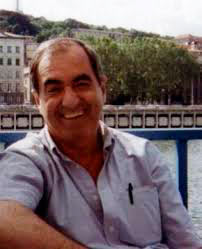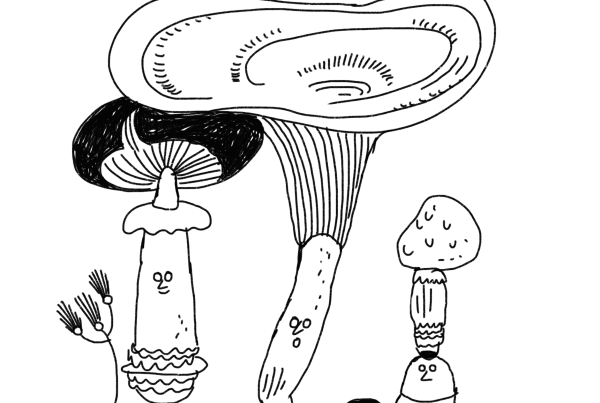Kazzum http://www.kazzum.org
We would like to honor the memory of Nat Eek, who passed away this April.
He was president of ASSITEJ from 1972-1975 and became Honorary President in 1984.
Nat Eek was one of the best Friends of ASSITEJ, not only because of his contributions to the ASSITEJ award, but also for having compiled the history of ASSITEJ in these three volumes: Discovering a New Audience for Theatre (1965-1975), Expanding the New Audience for Theatre (1976-1990), Maintaining The New Audience for Theatre (1991-2005).
Friends of ASSITEJ are not only those who have given a financial contribution.
The Friends of ASSITEJ are people who have remained in contact with our association and its activities, people who have never stopped collaborating and being a part of ASSITEJ.
If you want to meet the Friends of ASSITEJ, click here!
Friends of ASSITEJ is looking to become a continuous campaign and is linked directly to support the Next Generation Program.
There is a great future ahead for this Next Generation Program, but we still need your help to support emerging artists.
Thank you to all those who have been a Friend of ASSITEJ throughout the years!
We would like to honor the memory of Nat Eek, who passed away this April.
He was president of ASSITEJ from 1972-1975 and became Honorary President in 1984.
Nat Eek was one of the best Friends of ASSITEJ, not only because of his contributions to the ASSITEJ award, but also for having compiled the history of ASSITEJ in these three volumes: Discovering a New Audience for Theatre (1965-1975), Expanding the New Audience for Theatre (1976-1990), Maintaining The New Audience for Theatre (1991-2005).
Friends of ASSITEJ are not only those who have given a financial contribution.
The Friends of ASSITEJ are people who have remained in contact with our association and its activities, people who have never stopped collaborating and being a part of ASSITEJ.
If you want to meet the Friends of ASSITEJ, click here!
Friends of ASSITEJ is looking to become a continuous campaign and is linked directly to support the Next Generation Program.
There is a great future ahead for this Next Generation Program, but we still need your help to support emerging artists.
Thank you to all those who have been a Friend of ASSITEJ throughout the years!
We would like to honor the memory of Nat Eek, who passed away this April.
He was president of ASSITEJ from 1972-1975 and became Honorary President in 1984.
Nat Eek was one of the best Friends of ASSITEJ, not only because of his contributions to the ASSITEJ award, but also for having compiled the history of ASSITEJ in these three volumes: Discovering a New Audience for Theatre (1965-1975), Expanding the New Audience for Theatre (1976-1990), Maintaining The New Audience for Theatre (1991-2005).
Friends of ASSITEJ are not only those who have given a financial contribution.
The Friends of ASSITEJ are people who have remained in contact with our association and its activities, people who have never stopped collaborating and being a part of ASSITEJ.
If you want to meet the Friends of ASSITEJ, click here!
Friends of ASSITEJ is looking to become a continuous campaign and is linked directly to support the Next Generation Program.
There is a great future ahead for this Next Generation Program, but we still need your help to support emerging artists.
Thank you to all those who have been a Friend of ASSITEJ throughout the years!
We would like to honor the memory of Nat Eek, who passed away this April.
He was president of ASSITEJ from 1972-1975 and became Honorary President in 1984.
Nat Eek was one of the best Friends of ASSITEJ, not only because of his contributions to the ASSITEJ award, but also for having compiled the history of ASSITEJ in these three volumes: Discovering a New Audience for Theatre (1965-1975), Expanding the New Audience for Theatre (1976-1990), Maintaining The New Audience for Theatre (1991-2005).
Friends of ASSITEJ are not only those who have given a financial contribution.
The Friends of ASSITEJ are people who have remained in contact with our association and its activities, people who have never stopped collaborating and being a part of ASSITEJ.
If you want to meet the Friends of ASSITEJ, click here!
Friends of ASSITEJ is looking to become a continuous campaign and is linked directly to support the Next Generation Program.
There is a great future ahead for this Next Generation Program, but we still need your help to support emerging artists.
Thank you to all those who have been a Friend of ASSITEJ throughout the years!
We would like to honor the memory of Nat Eek, who passed away this April.
He was president of ASSITEJ from 1972-1975 and became Honorary President in 1984.
Nat Eek was one of the best Friends of ASSITEJ, not only because of his contributions to the ASSITEJ award, but also for having compiled the history of ASSITEJ in these three volumes: Discovering a New Audience for Theatre (1965-1975), Expanding the New Audience for Theatre (1976-1990), Maintaining The New Audience for Theatre (1991-2005).
Friends of ASSITEJ are not only those who have given a financial contribution.
The Friends of ASSITEJ are people who have remained in contact with our association and its activities, people who have never stopped collaborating and being a part of ASSITEJ.
If you want to meet the Friends of ASSITEJ, click here!
Friends of ASSITEJ is looking to become a continuous campaign and is linked directly to support the Next Generation Program.
There is a great future ahead for this Next Generation Program, but we still need your help to support emerging artists.
Thank you to all those who have been a Friend of ASSITEJ throughout the years!
We would like to honor the memory of Nat Eek, who passed away this April.
He was president of ASSITEJ from 1972-1975 and became Honorary President in 1984.
Nat Eek was one of the best Friends of ASSITEJ, not only because of his contributions to the ASSITEJ award, but also for having compiled the history of ASSITEJ in these three volumes: Discovering a New Audience for Theatre (1965-1975), Expanding the New Audience for Theatre (1976-1990), Maintaining The New Audience for Theatre (1991-2005).
Friends of ASSITEJ are not only those who have given a financial contribution.
The Friends of ASSITEJ are people who have remained in contact with our association and its activities, people who have never stopped collaborating and being a part of ASSITEJ.
If you want to meet the Friends of ASSITEJ, click here!
Friends of ASSITEJ is looking to become a continuous campaign and is linked directly to support the Next Generation Program.
There is a great future ahead for this Next Generation Program, but we still need your help to support emerging artists.
Thank you to all those who have been a Friend of ASSITEJ throughout the years!
We would like to honor the memory of Nat Eek, who passed away this April.
He was president of ASSITEJ from 1972-1975 and became Honorary President in 1984.
Nat Eek was one of the best Friends of ASSITEJ, not only because of his contributions to the ASSITEJ award, but also for having compiled the history of ASSITEJ in these three volumes: Discovering a New Audience for Theatre (1965-1975), Expanding the New Audience for Theatre (1976-1990), Maintaining The New Audience for Theatre (1991-2005).
Friends of ASSITEJ are not only those who have given a financial contribution.
The Friends of ASSITEJ are people who have remained in contact with our association and its activities, people who have never stopped collaborating and being a part of ASSITEJ.
If you want to meet the Friends of ASSITEJ, click here!
Friends of ASSITEJ is looking to become a continuous campaign and is linked directly to support the Next Generation Program.
There is a great future ahead for this Next Generation Program, but we still need your help to support emerging artists.
Thank you to all those who have been a Friend of ASSITEJ throughout the years!
We would like to honor the memory of Nat Eek, who passed away this April.
He was president of ASSITEJ from 1972-1975 and became Honorary President in 1984.
Nat Eek was one of the best Friends of ASSITEJ, not only because of his contributions to the ASSITEJ award, but also for having compiled the history of ASSITEJ in these three volumes: Discovering a New Audience for Theatre (1965-1975), Expanding the New Audience for Theatre (1976-1990), Maintaining The New Audience for Theatre (1991-2005).
Friends of ASSITEJ are not only those who have given a financial contribution.
The Friends of ASSITEJ are people who have remained in contact with our association and its activities, people who have never stopped collaborating and being a part of ASSITEJ.
If you want to meet the Friends of ASSITEJ, click here!
Friends of ASSITEJ is looking to become a continuous campaign and is linked directly to support the Next Generation Program.
There is a great future ahead for this Next Generation Program, but we still need your help to support emerging artists.
Thank you to all those who have been a Friend of ASSITEJ throughout the years!
We would like to honor the memory of Nat Eek, who passed away this April.
He was president of ASSITEJ from 1972-1975 and became Honorary President in 1984.
Nat Eek was one of the best Friends of ASSITEJ, not only because of his contributions to the ASSITEJ award, but also for having compiled the history of ASSITEJ in these three volumes: Discovering a New Audience for Theatre (1965-1975), Expanding the New Audience for Theatre (1976-1990), Maintaining The New Audience for Theatre (1991-2005).
Friends of ASSITEJ are not only those who have given a financial contribution.
The Friends of ASSITEJ are people who have remained in contact with our association and its activities, people who have never stopped collaborating and being a part of ASSITEJ.
If you want to meet the Friends of ASSITEJ, click here!
Friends of ASSITEJ is looking to become a continuous campaign and is linked directly to support the Next Generation Program.
There is a great future ahead for this Next Generation Program, but we still need your help to support emerging artists.
Thank you to all those who have been a Friend of ASSITEJ throughout the years!
Por Luis Matilla
Con el comienzo del nuevo siglo Assitej-España experimentó un profundo cambio generacional. La llegada de jóvenes profesionales del teatro para niños portadores de ideas renovadoras y problemáticas comprometidas con la sociedad en la que vi ve y se desarrolla nuestro joven público, rigor de las artes escénicas dirigidas a la infancia y la juventud.
ve y se desarrolla nuestro joven público, rigor de las artes escénicas dirigidas a la infancia y la juventud.
La interacción entre autores/as, intérpretes y directoras/es que iniciaron su andadura en la década de los setenta con jóvenes incorporados a la escena recientemente, ha permitido la exploración de temáticas vedadas durante los años en los que la censura imponía sus rígidos criterios. En unos encuentros teatrales desarrollados en la ciudad de Granada, los profesionales allí reunidos llegamos a la conclusión de que no existían temas tabú en el teatro dirigidos a las primeras edades, sino tratamientos inadecuados en el desarrollo de los conflictos, así como una carencia de nuevas formas contemporáneas en la mayoría de las producciones.
Actualmente se representan obras vinculadas a las problemáticas sociales existentes en el mundo que intentan paliar la visión con los que los medios de comunicación nos bombardean habitualmente. Numerosos montajes ofrecen a los espectadores visiones poéticas, innovadoras y divergentes de aquellos conflictos a los que se enfrentan los adolescentes de nuestras sociedades.
Los espectáculos de danza que algunas compañías presentaron en los últimos años han situado a la audiencia infantil ante nuevos lenguajes expresivos poseedores de estimables niveles de calidad. También hemos de referirnos al evidente avance del teatro de títeres ofrecidos por compañías que han ido evolucionando no solo su técnica, sino también el concepto artístico y constructivo de sus personajes.
En unos momentos de evidentes dificultades económicas, profundos recortes y desproporcionadas cargas fiscales a las artes escénicas, los profesionales de nuestro teatro para la infancia y la juventud han sabido resistir y demostrar el valor del arte del teatro en la formación de la sensibilidad artística. Este desafío del sector está siendo reconocido por numerosos padres que cada vez de un modo más asiduo, acuden con sus hijos a los locales que ofrecen espectáculos de calidad dirigidos a las primeras edades. (I)
Sin lugar a dudas nos queda mucho camino por recorrer, sin embargo confiamos que en los próximos 50 años la cooperación entre todos los centros nacionales que componen ASSITEJ sea cada vez más estrecha, con objeto de lograr la necesaria interacción y conocimiento de los nuevos lenguajes teatrales que las jóvenes generaciones están ofreciendo en sus respectivos países.
(I) Párrafo optativo
La publicación por parte de ASSITEJ-España de una extensa colección de textos teatrales, unida a la labor de otras editoriales, ha permitido dar a conocer a numerosas autoras y autores de las nuevas generaciones, facilitando la lectura de sus obras en un amplio número de centros educativos del país.
¿Diálogo intergeneracional? ¿En el teatro?
Por *Jesús campos García
Tener algo que decir, sentir la necesidad de contarlo, saber a quién quieres decírselo y encontrar el modo de hacerlo es el cauce por el que se conduce toda comunicación. También la creativa, también la dramática, también la infantil. Solo en dos ocasiones, a lo largo de mi quehacer autoral, me he dirigido por esos cauces a un receptor infantil. Específicamente infantil. Pues soy de los que creen que cualquier obra de adultos puede despertar el interés en espectadores de menos edad. Y doy fe de ello. En una ocasión, por circunstancias más o menos rocambolescas, un grupo de alumnos, con su profesor al frente, vino a ver la menos infantil de mis obras, Es mentira, pesadilla en la que unas ratas gigantes acababan fusilando a la protagonista. La atención con que aquellos niños asistieron a la representación (estaban petrificados) desmonta cualquier argumento con el que se pretenda defender la necesidad de un teatro específicamente infantil. Y aquí invertiría los términos: ¿por qué las obras infantiles no pueden ser igualmente interesantes para un público adulto?
En el 76-78 (Transición de la dictadura a la democracia) había mucho que decir y sentía la necesidad de contarlo. Y como, por otra parte, se daba la circunstancia de que mis hijos estaban en la edad de ser infantiles, traté de escenificárselo con las estrategias que consideré más adecuadas. No éramos enanos, éramos gigantes. Y esto era algo que había que tener claro si no queríamos ser manipulados. La Madrasta, la Reina, en definitiva, el poder quería que los enanitos trabajaran en la mina de diamantes, para así aumentar su belleza, o su riqueza, en vez de dejarles que extrajeran carbón con el que calentarse. La inocencia de Blancanieves o la llegada de un Príncipe Lejano que venía informado de otras realidades completarían la traslación del cuento tradicional a la nueva obra Blancanieves y los 7 enanitos gigantes, en la que se escenificaba la resistencia y el enfrentamiento ante el enemigo interior.
Pasaron muchos años, y también mucha vida, para que fueran otras las historias que podía contar, que sentía la necesidad de contar. La droga, que me había golpeado de cerca, era la cuestión con la que me dirigía de nuevo a un público infantil –en esta ocasión mis nietos–, y San Jorge y el Dragón la leyenda popular que utilicé como soporte para fabularla. La ciudad acosada por un dragón que habita en las alcantarillas entrega como tributo a sus jóvenes, tratando así de mantener un cierto equilibrio entre la pestilencia y la pujanza económica que generan tales negocios. Requerido San Jorge para que venga en su auxilio, este pretexta estar muy ocupado matando a sus propios dragones, y aconseja que actúen sin esperar a que nadie vaya a salvarles, pues todos debemos esforzarnos en la defensa de nuestra propia ciudad. Finalmente, cuando, tras muerte de la protagonista, sus amigos esperan que, como suele ocurrir en los cuentos, se produzca el milagro y todo acabe con final feliz, estos entenderán, muy a su pesar, que eso aquí no va a pasar porque la droga no es un cuento.
Y no hubo una tercera ocasión, aunque a veces lo haya intentado; pero, o no tuve clara la necesidad de decir o no tuve claro a quién me dirigía. Escribir orgánicamente conlleva estos problemas. Decir, por tanto, que con mi trabajo haya podido contribuir al diálogo intergeneracional me parecería un exceso. Ni aun habiendo escrito cientos de obras infantiles lo diría.
El teatro escrito por adultos para niños o jóvenes establece una comunicación, pero no un diálogo. El diálogo requiere reciprocidad. Que también los adultos seamos receptores de las dramatizaciones con las que ellos expresen sus emociones. Hace años que un grupo de autores de la AAT (Asociación de Autores de Teatro) vamos por institutos animando a los alumnos a que se prueben en la escritura teatral, como ya lo hacen de forma natural con la narrativa. Cuando todos seamos emisores y receptores, podrá hablarse de diálogo. Un diálogo desigual, pero no baldío.
Allá por los 70, una niña, de apenas catorce años, cuidaba de mis hijos –que entonces tendrían entre cinco y nueve años– cuando bajaban a la playa. Esto en los veranos, pero al parecer en los inviernos, como luego se verá, debía trabajar en otras casas en faenas más “laborales”. La niña –cuánto siento no recordar su nombre–, cuando supo que yo escribía teatro, tuvo la tentación de hacerlo ella también y, sin escribirla –que a saber si sabía–, inventó una escena que memorizó con mi hija. Ella sería la criada y mi hija la señora. Aún me asombro al recordar cómo no se fue por las ramas con cuentos y fantasías, sino que se ciñó a su realidad más inmediata. La criadita, escoba en mano, barría nerviosa y agobiada temiendo la llegada de la señora porque, según decía, aún lo tenía todo por hacer. Y, efectivamente, cuando llegaba la señora, esta se ponía a gritarle por lo sucio y desordenado que estaba todo. Asistir a aquella representación casera es lo más cerca que he estado nunca del diálogo intergeneracional. La obra finalizaba con la rebelión de la criada, que tiraba la escoba y salía gritando: “Mierda pa’ la escoba y el ama”.
*Autor teatral, Premio Nacional de Literatura Dramática, presidente de la AAT (Asociación de Autores de Teatro, con la que Assitej España realiza acciones conjuntas). La mayor parte de su ingente obra, se dirige a los adultos, pero ha hecho dos incursiones en el teatro para público infantil, Blancanieves y los 7 enanitos gigantes y La fiera corrupia





